| Главная » Файлы » "The Box of Antiquities" » Honey of Truth |
"The Box of Antiquities" - Honey of Truth
| 01.12.2012, 21:45 | |
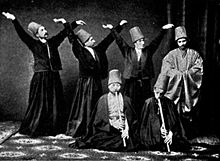 "What would you want?" God asked a Teacher. "Nothing”, the Teacher answered. "It is enough for me that You are..." (a Sufi parable) "What would you want?" God asked a Teacher. "Nothing”, the Teacher answered. "It is enough for me that You are..." (a Sufi parable)Hodja Nasreddin is sitting still on a donkey in the middle of Bukhara . His head is slanted in an obliging playful bow, his legs are hanging down to the ground, his shirt is unbuttoned, and his smile is affable and ironic. The left hand is respectfully pressed to his breast, the right one is lifted in a greeting.
Here is the master of jokes and anecdotes, the hero of parables and infinite stories. He is starry-eyed but full of worldly wisdom. He scatters bread crumbs to drive away tigers, and pays back the poor man who has been robbed. He brings a bull to a horse racing, and reads the king's mind. He throws coins to frogs in a bog, makes curdled milk of water, and rides a donkey back-to-front. But he takes the wind out of a yogi's sails, cools the preaching ardor of a monk, and argues with a Buddhist philosopher. He is the object of ridicule, but people call him Teacher. A ninny and master, a tramp and mullah, he always is by himself and at the same time in the center of everybody's attention. He alone embodies hundreds of persons. He is a Dervish, a wandering Dervish. A Sufi. How can one define Sufism? Is it a religious movement, philosophical doctrine, sect, or spiritual movement? May be it is Islamic mysticism as encyclopedias say? And is it possible to find a definition? Can love, mystery or sense of eternity be defined? Sufism does not know borders, does not know rules and system. Sufism is as imperceptible and paradoxical as our life is. Sufism is the Arabian collection of fairy-tales "Thousand nights and one night", Rubáiyát (Arabic: collection of poems ) by Omar Khayyám . It is "I" free of oneself. It is something that has forced the Baghdad Sufi Hussein ibn Mansur al-Hallaj to name himself God, and die for this impudence. ... A human being is dissolved in God. God descends to the ground. Duality leaves this world. A human being becomes a part of God... "Two Sufis, famous in their time, Jalal ad-Din Rumi and Yunus Emre met in Turkey. Rumi , the great poet, asked Yunus Emre if he had read his book. "Yes, I've read it”, Yunus Emre answered. ”It is beautiful, but it is a little bit long. I would write: "I descended from the sky, put on flesh and bones and named myself Yunus ", Emre answered. The only thing that Rumi "had forgotten" to mention was that a human being is similar to God". Way to Himself Yakub Ibn Yusuf (AUTHOR PHOTO)
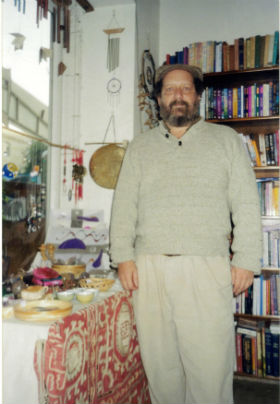 Yakub Ibn Yusuf, telling this parable, was a Sufi, a Jew Sufi. He was born Josh Heckelman to a religious Jewish family in New York . He lived in Jerusalem and kept a small bookshop "Olam Katan" ("The small world") in the German Colony quarters. His shop was the world of mysticism and religion: Sufi verses, the Jewish Cabbala, Chassidic parables, textbooks on yoga, meditation music, curative minerals, Eastern oils. This world was boundless and "small" at one and the same time. "In traditional religions the Universe is the creation of God, and each person is only a particle of this creation. In Sufism, on the contrary, each person is the shadow of the Creator, "the large world". Everything, surrounding him is the shadow of the person, "the small world", Yakub told. Yakub Ibn Yusuf, telling this parable, was a Sufi, a Jew Sufi. He was born Josh Heckelman to a religious Jewish family in New York . He lived in Jerusalem and kept a small bookshop "Olam Katan" ("The small world") in the German Colony quarters. His shop was the world of mysticism and religion: Sufi verses, the Jewish Cabbala, Chassidic parables, textbooks on yoga, meditation music, curative minerals, Eastern oils. This world was boundless and "small" at one and the same time. "In traditional religions the Universe is the creation of God, and each person is only a particle of this creation. In Sufism, on the contrary, each person is the shadow of the Creator, "the large world". Everything, surrounding him is the shadow of the person, "the small world", Yakub told. It took him long to become a Sufi. He got Jewish education, was acquainted with well-known Shlomo Carlebach , and studied Cabbala and Buddhist meditation. He was an apprentice to Zalman Shechter from Chabad. Shechter introduced Josh to the idea of Rabbi Nahman about "hidden Zadik". "Zadik" is the "righteous man” who connects people with God. He is "inside” each person. The way to the Creator passes through "him”, he is the bridge between Heaven and Earth. But the "righteous man” only arouses in those few who have the talent of feeling God. "I have learned much, but my inner world did not change", Ibn Yusuf said. It was on the Mount of Olives in Jerusalem that he found his teacher, and the Teacher was a Sufi master. The Sufi Teacher showed him the way to "the Perfect person" inside himself (in Sufi terminology it is a prototype for the "Zadik" Rabbi Nahman ) and to God. Josh accepted Sufism, and took the name Yakub Ibn Yusuf after his father and grandfather. For seven consecutive years Yakub came to East Jerusalem . Then he met in Canada his new teacher, Murat Yagan. However, those studies did not last long. Yakub felt discontent. "Polar forces collision is important for inner development. British Columbia is a real paradise: peace, a wonderful climate, polite people. To get "strain" Murat created conflicts inside the group. It looked artificial. That is why I decided to make a 180-degree turn: internal peace amidst external stresses. I came to Israel , and here, you know, there is no lack of sharp sensations", said Yakub. His new mentor and friend, a Turkish Sufi Mehmet Celim did not see any contradiction in Yakub being a Jew. From time to time they met: Yakub went to Turkey, Mehmet - to Jerusalem and Zefat, where he was intrigued by the mysticism of Cabbala. Did Yakub have problems with self-identification? Most likely, not, but external contradictions existed. "I would go to a mosque in Israel if I could. Unfortunately, it is impossible", - he wrote. But these contradictions are not essential: in fact if the form starts to influence the essence, it means that the defect is in the essence. "Because Sufism”, Yakub continued, "does not only belong to Muslims as Cabbala does not belong exclusively to Jews, and meditation - to Buddhists. They only are different runaways of one tree. They are the same secret knowledge, given to people in different envelopes. Extract of Eternity Al-Hallaj (Wikipedia) 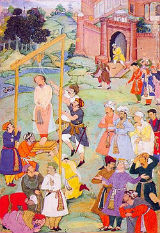 Where and when Sufism arose? Scientists and historians have many different versions, but Sufis themselves remain indifferent to these researches. Where and when Sufism arose? Scientists and historians have many different versions, but Sufis themselves remain indifferent to these researches. Wisdom of Sufis, full of poetry and allegories, compares Sufi knowledge to wine, and religions to vineyards. People had got to know the taste of wine before they started planting vineyards. How? It is known only to great prophets sent in due time to the Earth. Sufism does not belong to specific people. But early Islam with its tolerance and depth was the best for semination of Sufism. For a long time Sufis had to defend themselves from attacks of Muslim theologians who considered them sorcerers, wizards and trouble-makers. An Iraqi Sufi from Baghdad al-Hallaj was hanged head down, beaten by stones and quartered because in ecstasy he had pronounced: "God is I". It was so till the XIth century when a Spanish philosopher and Sufi al-Ghazzali proved that Sufism does not put in question Islamic monotheism. Due to Islam Sufism extended worldwide, through Spain and Sicily reaching Europe ignorant in those days. Flight of a Bee
The word "Sufism" is a derivative from "Suf" (wool), referring to the woolen cloaks Sufis wore. In ancient oriental tradition wool was the symbol of detachment, modesty, and piety. There are esoteric concepts, that sound alike in other cultures: " Sofia " (wisdom) in Greek, cabbalistic "Ein Sof" (absolute infinity) in Hebrew, "Savfa" (sanctity) in Arabic. Is it accidental?
"If you remove symbols and the conception of spheres from Cabbala”, Yakub wrote, "you will see, that both mystical movements, Cabbala and Sufism, are very much alike". Wisdom, forgotten by one nation is transferred to the second one, and then further on to the third one till it returns to the initial carrier. Here lies the greatness of the Creator's plan who has divided mankind into cultures and religions. Otherwise the world would be doomed to the dictatorship of one idea, one will and spiritual death. The Eastern "wine of wisdom” is sated with secret knowledge of the revelation, given to Jews. "Moses, the leader of his people, made stone as fragrant as musk", Hakim Sanai wrote in his book «The Walled Garden of Truth» ( Hadiqatu'l Haqiqat) . In Sufi interpretations Moses personifies the Idea of spiritualizing the animal beginning of a human being. Jews, in their turn, appealed to the Sufi experience in order to bring light to their Law growing stiff. "The son and grandson of the great Rambam (Rabbi Moses Ben Maimon) tried to set Sufism to the language of Judaism. But their teaching was too dry and rational, without alive feeling", Ibn Yakub wrote. However Hassids got such a feeling. Historians consider that the technique of reaching religious ecstasy has been borrowed by followers of Baal Shem Tov (Rabbi Yisrael ben Eliezer) from Sufis. Frantic dance, shouts tearing the body envelope, dilution in "brothers", submission to the "teacher" are common in Hassidism and Sufism. Baal Shem Tov & Roger Bacon
(Wikipedia)
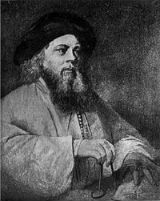 "There are assumptions that Baal Shem Tov met Sufis in Carpathians. His concepts were the reflection of Sufi philosophy", Yakub continued. "There are assumptions that Baal Shem Tov met Sufis in Carpathians. His concepts were the reflection of Sufi philosophy", Yakub continued.  Sufis are indifferent to clothes. They compare themselves to a bee, which collects honey from different flowers, but does not turn into honey. It is impossible to follow the flight of a bee, but it knows, where exactly it flies and what flower will sit on Sufis are indifferent to clothes. They compare themselves to a bee, which collects honey from different flowers, but does not turn into honey. It is impossible to follow the flight of a bee, but it knows, where exactly it flies and what flower will sit on The appearance of Book of Zohar at the end of the XIIIth century coincided with the rise of Christian intellectual ideas, which gave the world Roger Bacon, Saint Francis of Assisi, Thomas Aquinas, Albert the Great and Meister Eckhart. It also was the heyday of Sufism. Was it a coincidence? Bacon, a philosopher and scientist from Oxford, studied at the School of Enlightenment in Cordoba. This school was based on the doctrine of a Jewish wise man Solomon Ibn Gabirol (Avicebron ). Under the influence of Ibn Gabirol Saint Francis of Assisi and Roger Bacon became members of the Franciscan Order. Ibn Gabirol himself was closely connected with Sufis. It does not look like a coincidence. It looks like a turning point in the history of the development of the spirit, hidden behind a screen of bloody and dazzling acts. Where does this invisible way of mystical knowledge lead the mankind? A Spanish Sufi Idries Shah quoted an ancient Sufi tale in his book "Sufism". Four traveling companions, one Persian, one Arab, one Greek and one Turk, become hungry. With just a coin between them, they begin to argue. "I want angur ," says the Persian. "I want uzum ," says the Turk. "I want inab ," says the Arab. "But I want stafil ," says the Greek. A passer by takes their coin and shortly, returns with grapes – "angur” in Persian, "uzum” in Turkish, "inab” in Arabic, "stafil” in Greek. The quarrelers were the representatives of different religions. The passer by was a Sufi. Giving them grapes, he showed that their religions differed only by names. Having understood this, they should stop senseless disputes and take up their main task - learning to do wine from grapes. They should peel off the symbols to find out the quintessence of all religions - ways of comprehension of God and love for fellow creatures. "I thought about various beliefs, passionately wishing to understand them, and understood that they are similar to many branches of one tree. Do not force a man to prefer one belief to another because it will distract him from the trunk. In fact the trunk itself searches for the person and shows him its greatness and all its secret values for him to comprehend them" (Hussein ibn Mansur al-Hallaj ). The same idea is in Omar Khayyam 's verses: "In a cloister and cell, a monastery and synagogue Some are frightened by hell, others dream of paradise, But in the hearts of those who have comprehended divine secrets, There is no place to such imaginations". The Jerusalem Sheikh Sheikh Aziz Bukhari (AUTHOR PHOTO) 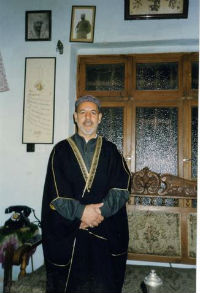 In the XIIIth century a Sufi Sheikh Baha-ud-Din Naqshband Bukhari from Bukhara sent his pupils to all parts of the world to spread the secret knowledge. Some of them went to the Holy Land - one of the saddest and neglected corners of the Old World at that time. They settled in Jerusalem and became a part of the huge Naqshbandi Sufi Order (Tariqat) . At present it is headed by Sheikh Aziz Bukhari. In the XIIIth century a Sufi Sheikh Baha-ud-Din Naqshband Bukhari from Bukhara sent his pupils to all parts of the world to spread the secret knowledge. Some of them went to the Holy Land - one of the saddest and neglected corners of the Old World at that time. They settled in Jerusalem and became a part of the huge Naqshbandi Sufi Order (Tariqat) . At present it is headed by Sheikh Aziz Bukhari. Bukhari cherishes memories of the past. His house, hidden in the "beehive" of internal yards in the Old City of Jerusalem, is decorated by carpets, as they do in Central Asia , photos of his grandfather, father and their families. Once a week Sufis gather in the house of Sheikh Aziz Bukhari for an evening vigil – zikr. Zikr is going away from every day reality. Buddhists fall into trance by meditation in silence and loneliness. Sufis lead by a teacher-Sheikh induce trance by dancing, singing, and rhythmical flapping to music. Zikr begins with conversations, reading of prayers and verses while drinking strong tea or coffee. "We try to concentrate one on another. The Sheikh sees all the people sitting opposite him. He speaks, listens, answers. Gradually people start feeling as a whole, their force accumulates”, Sheikh Bukhari said. Unification of people spirals their inspiration leading them up to the peak - the unification with Almighty. Zikr assumes its second stage. The ideas and feelings of Sufis are now directed not to each other, but to God. The rhythm, tune, and movements of bodies unite everyone's pray into one bunch of the feelings sent upwards. Ignorant find no sense in zikr . Words look as muffled mutter; movements seem chaotic, convulsive, and dancing looks mad. But there always is perfection and orientation in this act. Every Sufi Tariqat has its own way of achieving the maximal concentration and detachment: dance, rotation, jumps, fighting movements. Sheikh Aziz Bukhari showed me how trance is reached in Naqshbandi Tariqat . He closed his eyes and started rocking himself slowly. "We sit down on the ground, our eyes are closed, and everyone repeats one and the same motive. The sound grows louder, rocking becomes more frequent. There are no other thoughts except of God. The recitative which we repeat is a pray: "There is no other god, except God". We ask God to forgive us. It is the obligatory beginning, the introduction. Because everyone is sinful, everyone makes mistakes, sometimes unconscious. We ask for mercy, and then we thank Him. God gave us everything, and we do not even think of thanking Him. Take for example our eyes. How fragile, vulnerable and unique they are! We can see the world. But how many times in our lives have we thanked Him for them?" "He knows who tries" Sufism is a philosophy. "A person does not know, what he wants, what he has come to this world for. He complains about his life. He addresses doctors, lawyers, officials, but not God. He forgets the rule: when you ask, ask not from the servant but from the owner. Do not accuse God of yours miseries, in fact you yourself do not know, what will be better for you", Bukhari explained. Parables are the Sufi language. One of them is a story about a ruler of one realm who decided to become a virtuous sovereign. Twice, leaving his palace, he gave a gold ingot sewn up in a chicken to a poor man. The poor man sold the chicken to the warder almost for nothing. At last the ruler ordered his servants to accompany the poor man with "the gold chicken" to his house. "Did he cut the chicken?" the ruler asked when they returned. -"Yes" -"Did he see the gold ingot? Was he happy?" - "No, he fell to the ground and died", a servant answered. ... At night when the king was sleeping God came to him in his dream. God told him: "If I had wanted, I would have made him rich. But you decided to make him rich, and he died". "God knows that people are poor and unfortunate. But He also knows that money will not help them but will only increase their sufferings. One must be grateful to the Creator for what he has, accept life as it is and appreciate it". Sheikh Bukhari thinks that people try to deceive God. Their prayers are too often false, and their piety is ostentatious. They are similar to negligent workers who hope to deceive their master. However, nobody can deceive the Real Master... "A true religion is an inside work, not prayers in a mosque, church or synagogue. There is a story about a man who days and nights prayed in a mosque. His relatives brought him food and looked after him. He considered himself to be almost sacred. However, actually he was an egoist ", Bukhari told. One's behavior is nothing compared to the soul-perfecting process. "The Prophet has a story about a person who has come back from war. He finished his "small war" to begin a "great" one – the war with his instincts and errors". The philosophy of Sufism teaches how to overpower this enemy. There are no rules and instructions here. It is impossible to study Sufism from books. It can be understood only through personal experience. "He knows who tries" , a Sufi aphorism says. "How to describe the difference in tastes of honey and sugarcane? " disciples asked their Sufi teacher al-Hamdani. "You need to taste honey", al-Hamdani answered. The word Tariqat means a "palm tree”. But in a more comprehensive sense it means "to be on one's way”. "When you approach the sea talks about inflows are forgotten" (Hakim Sanai, Hadiqatu'l Haqiqat or The Walled Garden of Truth). Beam of Deity 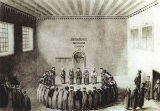 Must a man who has taken the Path of Heavenly Love abandon earthly love? For a Sufi there is nothing more ridiculous than this question. Asceticism and solitary life are alien to Sufism, and early Sufism (as in Omar Khayyam and Ibn Arabi poems) is full of love lyrics. Love of a woman and love of God are only different sides of one truth, and every touching it is magic, Ibn Arabi believed. Jalal ad-Din Rumi thought a woman to be "a beam of Deity". Rumi, Omar Khayyam and Ibn Arabi crossed the border of such definitions as "good" and "bad”. There is no good source or bad source, vile love or elevated love. There is love or absence of love; life or absence of life. Must a man who has taken the Path of Heavenly Love abandon earthly love? For a Sufi there is nothing more ridiculous than this question. Asceticism and solitary life are alien to Sufism, and early Sufism (as in Omar Khayyam and Ibn Arabi poems) is full of love lyrics. Love of a woman and love of God are only different sides of one truth, and every touching it is magic, Ibn Arabi believed. Jalal ad-Din Rumi thought a woman to be "a beam of Deity". Rumi, Omar Khayyam and Ibn Arabi crossed the border of such definitions as "good" and "bad”. There is no good source or bad source, vile love or elevated love. There is love or absence of love; life or absence of life. ... Once Hodja Nasreddin' s disciple asked his teacher to show the apple of Eden to him. Hodja Nasreddin bent down and lifted a rotten apple lying at his legs. The pupil was amazed: "The apple of Eden should be perfect!" -"The Heavenly apple is perfect, but you would not see a Paradise apple in any other form ", Nasreddin answered. Our perception is limited, and a person not developed spiritually can hardly understand, how a physical body and spirit melt away into one unity. It was equally difficult for people in the past to believe that the ground was round; that vapor, hail, snow and fog were all water in its different conditions. Spiritual Way is not the way from a town to a monastery. For Sufi live beauty is more splendid than the most brilliant theory. Any scheme emasculates the sense of creation. In his poem Masnavi Rumi tells about a mullah who found a falcon on a window sill. "What a strange pigeon!" the mullah said indignantly. He caught the bird, shortened its beak and claws and set it free. "Thank God, now you look like a bird, you must have been badly cared about ", mullah pronounced with satisfaction. Love outside one's nature, with "the beak and claws cut” is not love. Love of God without recognition of life created by Him is not love. Love of general ideas without love of beauty, personified as a woman, is not love. Ibn Arabi (Wikipedia)
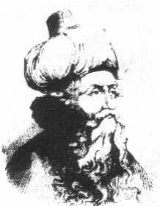 "My heart can take any shape:
For a monk it will become a monastery, for idols - a temple, For gazelles - a pasture, for the faithful – Kaaba. It can become a roll of the Torah and Koran. My belief is Love; no matter where its camels turn, Love remains my religion and belief...” (Ibn Arabi ). "There is no Sufi without integrity" A Sufi doesn't imagine himself outside of mundane world. "It is important for Sufis to live among people, in the atmosphere of spiritual pressure which wakens consciousness”, Yakub Ibn Yusuf said. – "One can't love the world staying far from it, or love people staying far from them”. The majority of Sufis, including Sufi Sheikhs, try to be in the center of life, have business and families. "Every Sufi should realize himself within the limits of this world, live in it. Many teachers have shops or stores, and it is not accidental. A shop is not only the source of income; it also is the place where people gather. A Sheikh can talk, participate, listen and ask here ". One Sufi teacher was asked, what it meant to be a Sufi. The answer was: "To get up in the morning, go to the market and think about God". Sufis have neither finished formulas, nor a single accomplished school or system. Sufi notions look as unsteady and escaping, as a mercury ball. "There are Sufis who diligently observe religious canons, and those who do not. There are supporters of mystical approaches and rationalistic ones. There are disputes about the ways of achievement of religious ecstasy. One needs much experience and has to make efforts to feel a Sufi", Yakub explained. Elusiveness of Sufism drives mad those people, who got used to cognizing the world by means of logic. ... "A person entangles himself in his chains. A Lion (a Person of the way) breaks his cage to pieces" (Hakim Sanai, The Walled Garden of Truth)... Hodja Nasreddin
(Wikipedia)
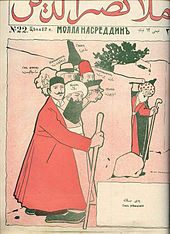 The following tale about Hodja Nasreddin and his pupil illustrates the idea. "A man came to stay with Nasreddin who lived in the mountains. Knowing that each act of the enlightened Sufi was full of sense, the beginner asked Nasreddin why he blew on his hands. "To warm them", the mullah answered. The following tale about Hodja Nasreddin and his pupil illustrates the idea. "A man came to stay with Nasreddin who lived in the mountains. Knowing that each act of the enlightened Sufi was full of sense, the beginner asked Nasreddin why he blew on his hands. "To warm them", the mullah answered. Soon Nasreddin poured two cups of soup and blew on it. "What are you doing this for, Master?" the pupil asked. "To cool the soup, of course", the Teacher answered. After that the pupil left Nasreddin . He could not trust the person using the same methods for achieving opposite results". How to connect incompatible? "Any secret protects itself, it is possible to find it out only in spirit and practice of Work", (a Sufi wisdom quote). What Work is meant here? Jalal ad-Din Rumi answered this question. The main thing, he said, is to waken the inside consciousness concealed in the "ruins of mind". "Join to the brotherhood, become similar to brothers, and you will feel the pleasure of real life. Go along the street and look at distraught owners of the "ruins". Drink a bowl of excitement for you do not feel shame. Close your eyes and learn to see with inner sight. Open your soul if you look for embraces. ... Forget about your life; rely on the kindness of Pastor... Think only about the creator of the Idea; forget about everything else; for it is better to think about Life, than bread. Why do you sleep in prison, when the open space of the divine land is around you? Reject confused thoughts and you will see the secret answer. Be silent and you will hear the language of immortality. Forget about life and the world and you will see the Life of the World". The secret opens itself to those who follow the Way. ... It is impossible to describe the taste of honey; it is necessary to try the honey. "He knows who tries". 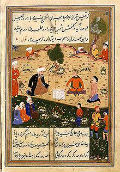 Not Christian or Jew or Muslim, Not Christian or Jew or Muslim, not Hindu, Buddhist, Sufi or Zen. Not any religion, or cultural system. I am not from the East or the West, nor out of the ocean or up from the ground, not natural or ethereal, not composed of elements at all. I do not exist, am not an entity in this world or the next, did not descend from Adam and Eve or any origin story. My place is placeless, a trace of the traceless. Neither body nor soul. I belong to the beloved have seen the two worlds as one and that one call to and know, First, last, outer, inner, only that breath breathing human — Jalaluddin Rumi , 'Only Breath' (from The Essential Rumi translated by Coleman Barks with John Moyne) | |
| Просмотров: 856 | Загрузок: 0 | Рейтинг: 3.5/2 | |
| Всего комментариев: 0 | |
